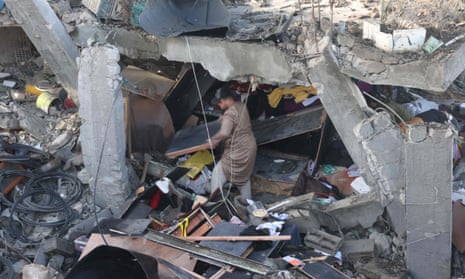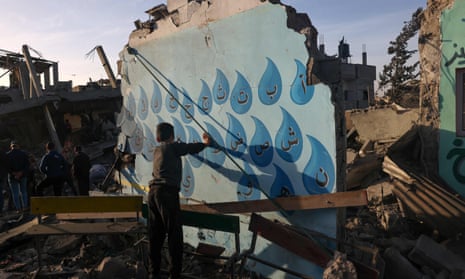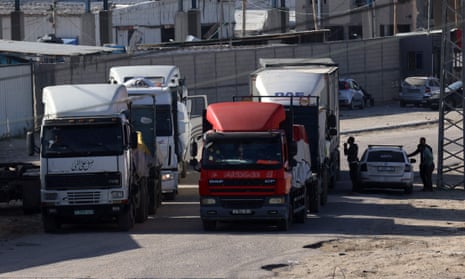‘War is not over yet’, Israeli military spokesperson warns
“The war is not over yet,” the Israeli military spokesman Avichay Adraee has said in a message in Arabic to Palestinian civilians in Gaza. In a post on X, formerly Twitter, he said:
The humanitarian pause is temporary. The northern Gaza Strip is a dangerous war zone and it is forbidden to move north. For your safety, you must remain in the humanitarian zone in the south.
It is only possible to move from the north of the Strip to the south via Salah al-Din Road. The movement of residents from the south of the Strip to the north is not allowed and dangerous
Prior to the ceasefire, Israel repeatedly bombed the south of Gaza despite telling Palestinians to flee there.
Key events
We reported earlier that the Israeli military had said warning sirens were sounding Eilat, amid fears of a long-range aerial attack launched from Yemen. The country’s armed forces have now said it was a false alarm – and there is no indication of any security incident, Reuters reports.
France’s top diplomat Catherine Colonna has met the Chinese Premier Li Qiang and foreign minister Wang Yi in Beijing as part of a short visit focused partly on the Israel-Hamas war. Agence France-Presse (AFP) quotes her as saying:
For us, all the hostages must be released. All, and not just 50.
About 240 people were abducted during Hamas’s cross-border attacks on Israel last month.
Paris has said that the conflict will be high on the agenda for Colonna and her Chinese counterparts.
“China is an actor with growing weight in the region” due to its “strong relationship” with Iran, a French diplomatic source said this week. “The first thing we expect from China in this conflict is to join its efforts with ours to ensure that we avoid any regional escalation.”
Beijing has recently sought to play a greater role in the Middle East; facilitating a historic rapprochement between Saudi Arabia and Iran, and sending an envoy to the region to push for a ceasefire in the Israel-Hamas conflict.
Sirens have sounded in Israel’s southern Red Sea resort of Eilat, warning of a possible long-range aerial attack from Yemen, Reuters quotes the country’s military as saying. Yemeni Houthis have previously launched drones and missiles at Israel in solidarity with Palestinian militants.
Jason Burke
In the crowded corridors of the European hospital in Khan Younis, exhausted doctors decide who among the huge influx of patients arriving from the north of Gaza should live or die.
Hundreds of casualties have moved south in recent days after the evacuation of hospitals in Gaza City, overwhelming medical staff already struggling with an acute lack of medicine, diminishing food rations and intermittent power and communications.
Injured people have joined thousands of displaced people seeking shelter and safety in medical facilities.
Paul Ley, an orthopaedic surgeon at the European hospital, said displaced people were sleeping in lifts, a small team was working round the clock in four operating theatres to amputate limbs infected after days without treatment, and there was an acute shortage of painkillers. Triage decisions had to be made instantly, which in one case meant leaving a 12-year-old child to die with only palliative care in order to preserve dwindling resources.
Ley said the hospital had received 500 patients evacuated from hospitals in northern Gaza in recent days.
The UK foreign secretary, David Cameron, is continuing his trip to the Middle East on Friday, meeting Palestinian leaders and committing the UK to a further £30m in aid for people in Gaza.
He will be in the occupied Palestinian territories, meeting Palestinian leaders and agencies delivering aid in Gaza and advocating adherence to the new agreement on all sides. Talks will focus on how UK efforts can help ease the suffering of Gaza’s citizens, who have been bombarded and besieged by Israel’s military, as more humanitarian aid is set to enter the territory amid the lull in fighting.
The former prime minister is urging “all parties to continue to work towards the release of every hostage” after holding talks with the Iaraeli prime minister, Benjamin Netanyahu, and the country’s president, Isaac Herzog, on Thursday.
The temporary ceasefire began at 7am local time (5am GMT). The first 13 hostages – women and children – are expected to be freed by Hamas at about 4pm local time (2pm GMT). They are the first of 50 due to be released over the four days, according to Qatari officials. Hamas said 150 Palestinian prisoners would be released by Israel.
The British daughter of a man who was kidnapped from Israel and taken to Gaza says her father would be “fighting to be at the back of the queue” of hostages to be released by Hamas.
Sharone Lifschitz told BBC Breakfast she did not know whether her father was dead or alive, only that he was taken to Gaza after being kidnapped from his home in the kibbutz of Nir Oz on 7 October. Speaking from Tel Aviv, she said:
My father spent 65 years building this community, we grew up collectively as children in my generation. If there is a queue, he is fighting to be at the back of the queue.
She said every hostage released was a “ray of light” in a “long and horrendous story”. Lifschitz’s mother, Yocheved Lifshitz, was released by Hamas from Gaza last month.
The UK prime minister, Rishi Sunak, has thanked Qatar and Egypt for their “intensive diplomacy” in helping to secure the pause in the fighting in Gaza.
The temporary truce came into effect early on Friday, setting the stage for the exchange of dozens of hostages held by militants in Gaza for Palestinians imprisoned in Israel.
Sunak tweeted: “This humanitarian pause is critical to end the terrible ordeal of hostages held by Hamas and get life-saving aid into Gaza.
“I want to thank Qatar, Egypt and others for the intensive diplomacy that has got us here. We will not stop until all hostages are safely returned.”
People in Gaza are salvaging what they can as the guns fall silent.


Aid trucks have been pictured as they enter Gaza via the Rafah crossing hours after the start of a four-day truce.

Aid trucks begin entering Gaza, Reuters reports
Aid trucks have begun entering the Gaza Strip from Egypt around 90 minutes after a truce began between Israel and Hamas fighters, according to Reuters TV footage.
Two of the trucks, representing Egyptian organisations, sported banners that said “Together for Humanity”. Another said “For our brothers in Gaza”.

Emily Foster is a globe-trotting journalist based in the UK. Her articles offer readers a global perspective on international events, exploring complex geopolitical issues and providing a nuanced view of the world’s most pressing challenges.








